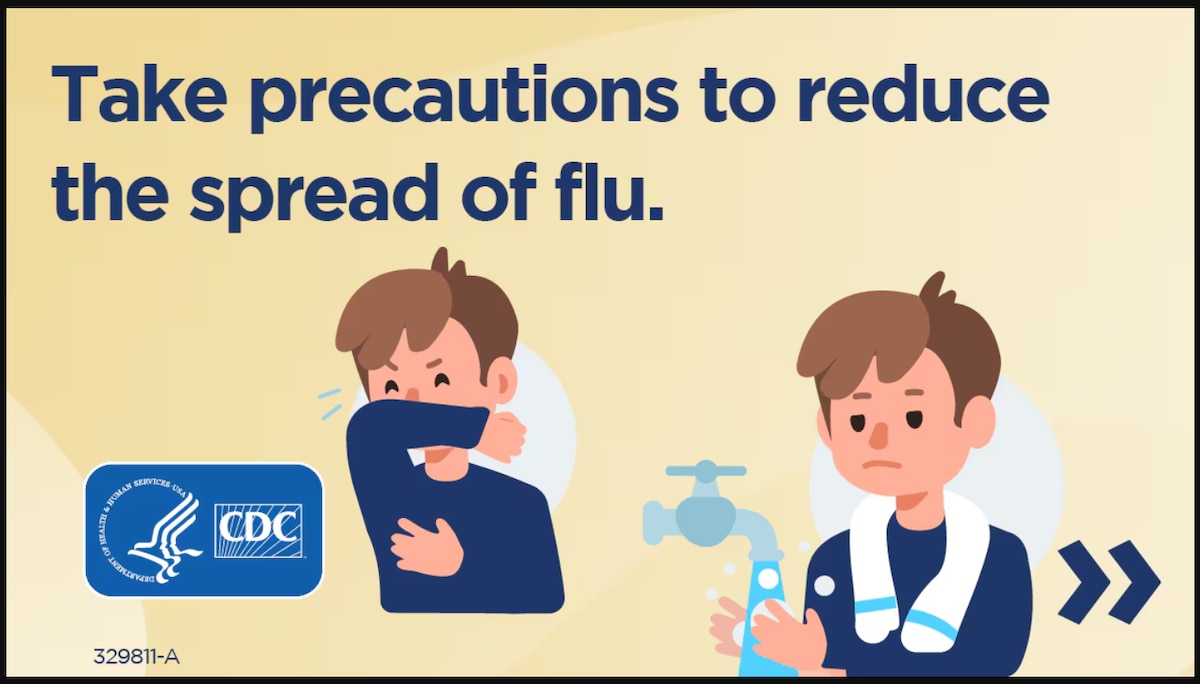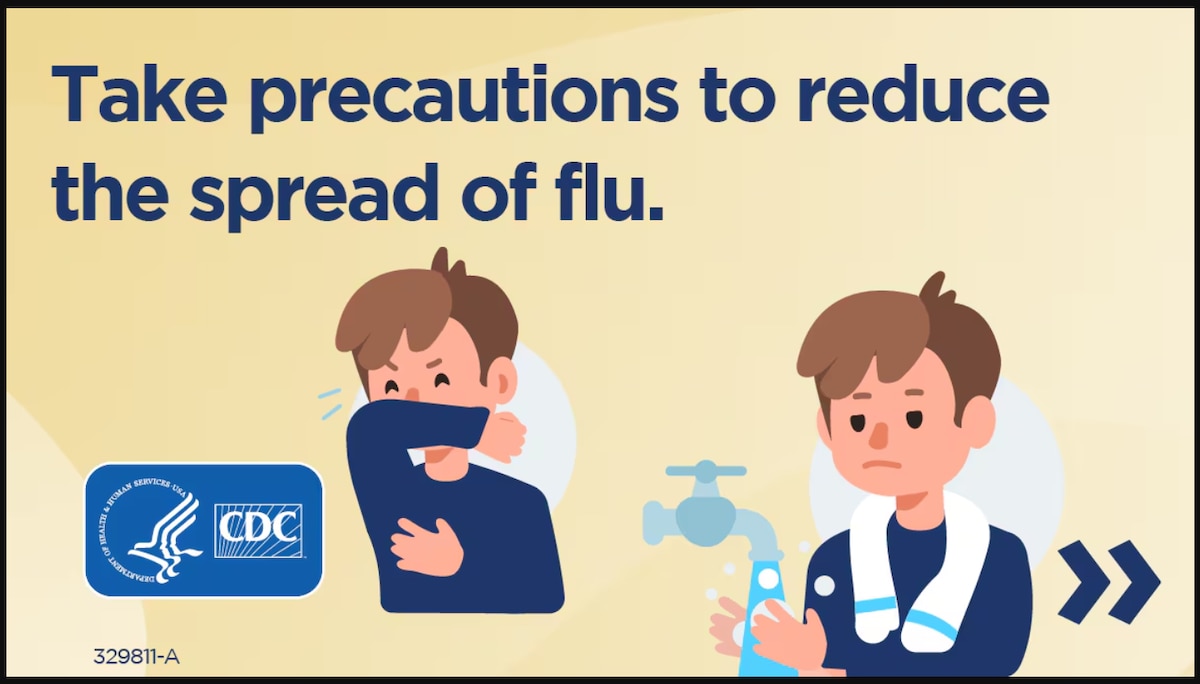Greg Chadwick
Concerned about catching the flu? We are all at risk for getting and spreading the flu.
There are many circumstances you and your family can be exposed to the flu virus. School, daycare, travel, work, and public places like stores, restaurants, airports, and fitness centers are germ-charged environments that facilitate the spread of flu.
In the U.S,, flu season occurs in the fall and winter. While influenza viruses circulate year-round, most of the time flu activity peaks between December and February.
Learn how to protect yourself from seasonal flu.
How does flu make you sick?
Flu is a contagious respiratory illness caused by influenza viruses. When people with the flu cough or sneeze, you can inhale droplets that contain flu viruses. The viruses infect your cells and make copies of themselves. Flu virus infection triggers inflammation in your body, which produces flu symptoms. Severe inflammation can cause lung damage and other serious problems. Your body’s immune system responds by sending proteins called antibodies to fight the infection. Some people experience serious flu complications that can lead to hospitalization and even death.
What are symptoms of flu?
- Fever.
- Chills and sweats.
- Muscle or body aches.
- Cough.
- Headache.
- Sore Throat.
- Runny or stuffy nose.
- Tiredness or feeling run down.
- Eye pain.
You may not have all these symptoms.
What should you do if you get flu?
Flu symptoms usually come on suddenly and are worse than the common cold. Flu spreads easily from person to person, so if you have flu-like symptoms stay home except to get medical care. Cover your coughs and sneezes with tissues and clean your hands with soap and water or an alcohol-based hand rub. Most people can manage flu symptoms at home and recover in a few days to less than two weeks, but some people will develop complications, like pneumonia, which can be life-threating. Because flu can cause severe illness, it’s important to keep an eye on your symptoms and get medical attention if you need it. This is especially important if you have an underlying health condition.
When should I go to the Emergency Room or seek immediate medical attention?
Go to the ER or seek immediate medical attention if you have symptoms of severe illness, including:
- High fever (over 103 °F/40 °C).
- Difficulty breathing.
- Not urinating or urinating very little.
- Pain in your chest or stomach (abdomen) that doesn’t go away.
- Persistent dizziness.
- Confusion.
- Severe muscle pain or weakness.
- Seizures.
- Bluish skin, lips or nails (cyanosis, which can be a sign of low oxygen levels in your blood or tissues).
- Fever or cough that gets better or goes away but then gets worse.
- Worsening of other health conditions.
What should I do when someone is sick?
- Choose only one caregiver to take care of sick family members.
- Keep the person with flu in a separate sick room if you can. Limit visitors other than the caregiver.
- If the sick person must leave the room, ask them to wear a facemask or use a tissue to cover coughs and sneezes.
- Keep the air clean. Open a window in the sick room or use a fan to keep fresh air flowing.
- Clean the sick room each day.
- Wash laundry with normal laundry soap and dry on a hot setting. Keep dirty laundry away from your face and body. Wash your hands right after touching dirty laundry.
- It’s ok to wash the sick person’s bedding or clothes with other people’s laundry.
- Wash the sick person’s dishes with normal dish soap or place in the dishwasher.
When can I go back to work/school?
To avoid spreading the flu to others, you shouldn’t go back to work or school until it has been at least 24 hours since you have had a fever (without taking fever-reducing medications). Your employer or school may have different requirements for returning.
How do I know if I have the flu or COVID-19?
Since they have similar symptoms, the only way to know for sure if you have the flu or COVID-19 is to get tested. They both have a risk of serious illness. But different viruses cause these infections, and providers treat them with different medications.
How can I prevent the flu?
“The best way to prevent the flu is to get an annual flu vaccine,” said Lt. Col. Dan Anderson, AFMC Command Public Health Officer. “While the immunization does not completely protect one from catching the flu, it will reduce the severity and duration of illness. In addition to speeding one’s recovery, this also minimizes the amount of time one is infectious and helps protect our friends and loved ones. The Centers for Disease Control and Prevention utilizes many data sources, including DoD surveillance, to recommend which specific influenza viruses are included in annual flu vaccines based upon the viruses most likely to circulate during the upcoming flu season.”
Anderson advises to speak with your medical provider if you have questions, are pregnant or have other underlying health conditions, and get the flu vaccine before the holidays to strengthen immunity in time to celebrate with your coworkers and family. Getting a flu vaccination in early allows for adequate time to develop enough antibodies, which can take up to two weeks, to provide protection throughout the flu season.
Where can I get a flu vaccine?
Influenza vaccinations for all military members are a mandatory requirement, and available through each installation’s Medical Treatment Facility (MTF) or at any participating TRICARE eligible pharmacies. To ensure records are updated accordingly, military members must provide their servicing MTF documentation of any vaccination not administered and recorded by a MTF.
TRICARE beneficiaries are also eligible for flu shots through immunization clinics on base, or at no cost at TRICARE eligible pharmacies. For the civilian workforce, all Federal Employee Health Benefit plans cover flu shots at no cost for members and are available at local retail pharmacies.
You can find a flu vaccine location through vaccines.gov.
Go to: https://www.vaccines.gov/
-Select "Find Flu Vaccines" at the top of the page
-Enter your 5-digit zip code
-Check your "Vaccine Options”
-Select "Search for Flu Vaccines" to find a preferred location
(Click on the location for further details and contact information)
In addition to getting the flu vaccine, there are many everyday preventive measures which can reduce your risk of getting the flu and other respiratory infections. These actions include:
- Wash your hands often with soap and water. If soap and water are not available, use an alcohol-based hand sanitizer.
- Avoid touching your eyes, nose, or mouth. Germs spread this way.
- Cover your mouth and nose with a tissue when coughing or sneezing. It may prevent those around you from getting sick. Flu viruses spread mainly by droplets made when people with flu cough, sneeze, or talk.
- Avoid being around other people when you or they are sick with the flu or other infectious diseases.
- If you become ill, get tested! This can rule-in or rule-out other respiratory viruses such as COVID, pneumonia or Respiratory Syncytial Virus (RSV).
- Clean and disinfect frequently touched surfaces and objects that may be contaminated with viruses that cause the flu at home and work.
- Avoid large crowds. If you are able to limit contact with people during flu season, you can reduce your risk of getting an infection.
- Strengthen your immune system. A strong immune system helps your body fight off infections. To build your immunity, sleep at least 7-9 hours per night. Also, maintain a regular physical activity routine-at least 30 minutes, three times a week. In addition, follow a healthy, nutrient-rich eating plan. Limit sugar, junk foods, and fatty foods. Instead, eat a variety of fruits and vegetables, which are full of vitamins and antioxidants, to promote good health.
Extensive seasonal flu resources are made available from the Centers for Disease Control and Prevention


